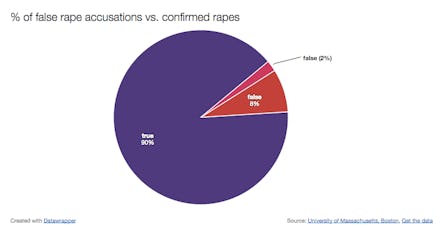One Chart Everyone Talking About The Rolling Stone Rape Story Needs to See

Rolling Stone may recover from their horrendous screw up in the UVA sexual assault story, but the damage to rape survivors has been done.
Our culture and justice system already scrutinize the behaviors of rape survivors far more than the actions of their assailants, and this disaster of journalistic integrity will only exacerbate the myth that women frequently lie about being raped — when in fact such an act is extremely rare.
How many rape accusations turn out to be false? If you ask college kids, half of them will tell you it's about 50%. In reality, the percentage hovers between 2%-10%.
Of course, as with any data about sexual assault, this is only an estimate. Indeed, most rapes are never reported at all. What's more, the rate of false rape accusations is similar to false reporting of other crimes, such as burglary or theft. Indeed, as I've written about before, men are five times more likely to win $10 000 in the lottery and 32 times more likely to be struck by lightening than to be the target of false sexual assault allegations. If you're a man, you're also much more likely to be a victim of rape than to have a woman wrongly accuse you.
It's vital to remember that supposed discrepancies in Rolling Stone's story in no way invalidate the experiences of most survivors. We made this chart to put the number of false accusations in perspective:
The jarring discrepancy between perception and reality regarding the frequency of false accusations should be enough to shut down rape apologists who assume women typically fabricate stories about being raped, or who criticize survivors for not going to the police. Of course many women aren't going to report when so many people (including the police) so often think they are lying.
Regardless of how this story plays out, and whether or not the alleged victim's story is entirely true, the lesson must not be that women shouldn't be trusted. It should be that journalists need to be vigorous when it comes to reporting about rape, and that lapses of journalistic integrity are not cause to assume most rape survivors are lying.
More importantly, although Rolling Stone may not have gotten the facts right, what remains true is that frat brothers are 300% more likely to rape. The only thing that will change that statistic is a radical reform in the system.
From college campuses to the military, we are only just beginning to take sexual assault seriously. Responsible media coverage of these stories can and should encourage more victims to come forward. We saw this happen recently, for example, when women courageously speaking out about Jian Gomeshi's violent behaviour caused a spike in sexual assault reports in Canada.
As women who have gone through sexual assault watch this story unfold, it's important, perhaps now more than ever, to remember that they deserve our support. Survivors need to be believed. And journalists need to fact-check because by failing to do so, it isn't only themselves that they are making vulnerable, it's rape victims.